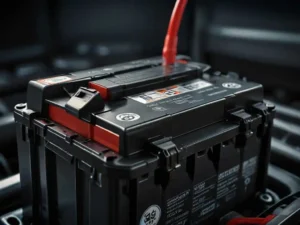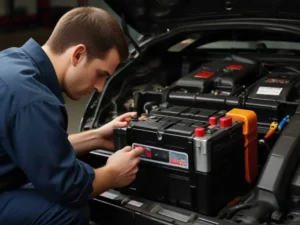
When to replace car battery? You should consider replacing your auto battery if it’s over 3 to 5 times old, if you notice slow machine twiddling, darkening headlights, or if your vehicle struggles to start. Regular conservation and periodic battery checks can help you determine when it’s time for a relief.
How Car Batteries Work?
Auto batteries are rechargeable devices that store electrical energy in the form of chemical energy. They primarily correspond of lead plates submerged in an electrolyte result, generally an admixture of water and sulfuric acid. When you turn the ignition key, the battery releases stored electrical energy to power the starter motor, which initiates the machine’s combustion process.
5 Clear Signs That You Need to Replace Car Battery:
When it comes to car maintenance, the battery is constantly overlooked until it fails. Still, being visionary and feting the signs that indicate your auto battery needs relief can help you avoid unanticipated breakdowns and insure smooth driving behavior. Then are five clear signs that you need to get your auto battery replaced: Car Battery
- Diminished Cranking Power: One of the most egregious signs of a failing battery is difficulty starting the engine. However, it could indicate a weakened battery, If you notice that your auto is slow to start or requires multiple attempts before the machine turns over. This symptom is especially conspicuous in cold rainfall, when batteries have to work harder to induce enough power.
- Dashboard Warning Lights: Modern vehicles are equipped with onboard diagnostics systems that cover colorful factors, including the battery. However, similar to the battery or check machine light, illuminate and stay on while driving, If your dashboard warning lights.
- Electrical Element Malfunctions: Your auto’s battery powers not only the starter motor but also colorful electrical factors, similar as lights, radio, and power windows. However, similar to fluttering headlights, dim innards lights, If you witness issues with these accessories. As the battery weakens, it may struggle to give enough power to support these functions, performing in erratic behavior.
- Swollen or Bloated Battery: Case A visual examination of your auto battery can reveal reflective signs of damage or deterioration. However, bloated, or monstrous, If you notice that the battery case appears blown. Swelling generally occurs due to inordinate heat or overcharging, both of which can significantly reduce the battery’s lifetime and performance.
- Old Age: Like all automotive factors, auto batteries have a finite lifetime. Most batteries last between 3–5 years, depending on factors similar to climate, driving habits, and maintenance. However, it’s wise to proactively replace it, indeed if you have not endured any conspicuous issues yet, If your battery is approaching or has exceeded its anticipated lifetime. Doing so can help unanticipated failures and vexation.
Tips for Maintaining Your Auto Battery:

Then are some tips to help you protract the life of your auto battery
- Regular Examination: Perform visual examinations of your auto battery regularly, checking for signs of erosion, leaks, or damage to the battery case. Look for any lump or bloating, which can indicate internal issues. However, have the battery audited by a professional, If you notice any abnormalities.
- Keep Terminals Clean: Corrosion on the battery outstations can hamper the inflow of electricity and lead to starting issues. Clean the battery outstations regularly using an admixture of incinerating soda pop and water or a technical battery terminal cleanser. Use a line encounter to remove any erosion buildup, ensuring good electrical contact.
- Strain Connections: Ensure that the battery outstations are securely tensed to the battery posts. Loose connections can beget electrical problems and contribute to battery drain. Use a wrench to strain the terminal clamps snugly, but avoid over-tightening, as it can damage the outstations.
- Drive Regularly: Extended ages of inactivity can beget the battery to discharge and lose its charge. However, consider using a battery maintainer or teardrop bowl to keep the battery outgunned up, If you are not driving your auto regularly. Alternately, take your auto for a short drive at least once a week to recharge the battery.
- Avoid Deep Discharges: Try to avoid completely discharging the battery whenever possible, as deep discharges can dock its lifespan. However, consider installing a deep-cycle battery or a binary-battery setup to power these devices independently, If you constantly use electrical accessories while the machine is out.
- Cover from Extreme Temperatures: Extreme heat or cold wave can affect battery performance and lead to unseasonable failure. Situate your auto in a shadowed area or garage during hot rainfall to reduce heat buildup around the battery. In cold rainfall, consider using a battery sequestration tackle or a heated battery mask to maintain optimal operating temperatures.
- Limit Electrical Cargo: Minimize the use of electrical accessories when the machine is out to reduce strain on the battery. Avoid leaving lights, suckers, or entertainment systems running for extended ages without the machine handling. Consider elevation to energy-effective LED lights to reduce power consumption.
- Test Battery Voltage: Periodically check the voltage of your auto battery using a multimeter or a battery tester.
How many miles until a car needs new battery?
|
Driving Conditions |
Approximate Mileage Until Battery Replacement |
|
Normal driving (city) |
4–5 years or 50,000–60,000 miles |
|
Normal driving (highway) |
4–6 years or 60,000–80,000 miles |
|
Frequent short trips |
3–4 years or 30,000–40,000 miles |
|
Extreme temperatures |
3–5 years or 40,000–70,000 miles |
| Heavy electrical load |
3–4 years or 40,000–50,000 miles |
Please note that these are rough estimates.
How do I check if my car battery is OK?
You can check your auto battery’s health through a visual examination for erosion or damage, testing its voltage with a multimeter, ensuring it’s within the ideal age range(3–5 times), and performing a starting test to see if your machine cranks smoothly. However, seek professional testing for a comprehensive evaluation, If in trustfulness. Regular checks help, unanticipated issues and insure your auto’s trustability. Car Battery Tester
Conclusion:
Your auto’s battery is a pivotal element that requires regular maintenance and attention. By understanding the signs of a failing battery and following the tips outlined in this companion, you can ensure that your vehicle’s electrical system remains dependable and functional. Flash back, when in trustfulness, it’s always stylish to have your battery tested by a professional to avoid being stranded with a dead car battery. Keep these tips in mind, and you will be well-equipped to keep your auto running easily for times to come.






